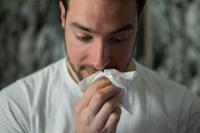
(Photo by Edward Jenner via Pexels)
The days of “pushing through” an illness are over, as nearly a third of Americans say they’d rather you didn’t show up to work if you’re feeling sick.
That’s according to a new survey of 2,000 people, which examined approaches to cold and flu and the evolving etiquette around rest and recovery.
Thirty-one percent said there’s no longer a badge of honor or admirable quality to people showing up to work ill, coughing or “powering through.” Just a quarter of Americans (25%) strongly believe it would impress bosses or superiors.
The survey conducted by Talker Research on behalf of Zipfizz also found that while 21% of people have attended work or a social gathering when ill in the last 12 months, the vast majority (86%) feel concerned about their own well-being when others come to work visibly sick.
"I had already committed" (28%) and "I couldn’t afford to miss work" (27%) were among the top reasons people gave for pushing through illness.

Only a little over a fifth (22%) of those currently employed said they felt pressure from their employer to show up even when they weren't feeling well.
While some still feel compelled to show up for work or social events despite being sick, this behavior doesn’t come without consequences.
Forty-two percent of people said their relationship with someone would be negatively affected if that person knowingly showed up sick.
This sense of betrayal was especially true among younger generations — specifically Gen Z and millennials — who increasingly value health and boundaries in social interactions.
In fact, 64% of those who said their relationship with someone would be harmed if they showed up sick also classified the person as “selfish.”
“The results of this survey reflect a significant cultural shift where taking care of one’s health is increasingly seen as more important than ‘powering through’ an illness,” said Marcela Kanalos, a spokesperson for Zipfizz. “While some may still feel compelled to show up despite being sick, it's clear that both personal well-being and social relationships are now top priorities for many, especially among younger generations who value boundaries and respect in social interactions.”
The shift in attitudes toward illness is most notable in the aftermath of the COVID-19 pandemic.
Fifty-seven percent of respondents said their expectations of others when it comes to sickness have changed since the pandemic began.
Seventy percent of people said they feel more cautious about hygiene and illness now compared to before the pandemic, with handwashing, social distancing and avoiding the sick becoming essential practices in both social and professional settings.
This heightened sense of hygiene is reflected in daily life, with many people avoiding shared spaces like buffets, charcuterie boards and communal tables, with 29% of respondents saying they feel uncomfortable eating from shared food in social settings.
This increased focus on health and hygiene is also reflected in the everyday habits people adopt to support their immune systems.
According to the survey, drinking plenty of water (67%), getting enough sleep (52%) and taking vitamins or supplements (including vitamin C, 47%) ranked among the most common ways Americans prioritize their well-being.
Interestingly, the growing caution about shared food and drinks also reflects deeper societal shifts.
While 49% of people would feel comfortable sharing food with friends, the numbers dwindle when it comes to co-workers or strangers. Only 24% of respondents said they’d share food with their co-workers, and a mere 3% would share drinks.
This cultural shift is not only reshaping how people approach illness in person, but also in digital spaces.
Seventy percent of respondents said they would feel comfortable turning off their camera during a video meeting if they were sick.
“As we continue to adapt to new expectations around health, it’s clear that people are becoming more mindful of how their actions affect others — both in person and online,” added Kanalos. “The rise in remote work and virtual meetings, combined with an increased focus on hygiene and personal well-being, reflects a broader understanding that health isn’t just about feeling better — it’s about respecting the health of those around you.”

Brittany Colette
Survey methodology:
Talker Research surveyed 2,000 Americans; the survey was commissioned by Zipfizz and administered and conducted online by Talker Research between Aug. 7 to Aug. 11, 2025.
We are sourcing from a non-probability frame and the two main sources we use are:
- Traditional online access panels — where respondents opt-in to take part in online market research for an incentive
- Programmatic — where respondents are online and are given the option to take part in a survey to receive a virtual incentive usually related to the online activity they are engaging in
Those who did not fit the specified sample were terminated from the survey. As the survey is fielded, dynamic online sampling is used, adjusting targeting to achieve the quotas specified as part of the sampling plan.
Regardless of which sources a respondent came from, they were directed to an Online Survey, where the survey was conducted in English; a link to the questionnaire can be shared upon request. Respondents were awarded points for completing the survey. These points have a small cash-equivalent monetary value.
Cells are only reported on for analysis if they have a minimum of 80 respondents, and statistical significance is calculated at the 95% level. Data is not weighted, but quotas and other parameters are put in place to reach the desired sample.
Interviews are excluded from the final analysis if they failed quality-checking measures. This includes:
- Speeders: Respondents who complete the survey in a time that is quicker than one-third of the median length of interview are disqualified as speeders
- Open ends: All verbatim responses (full open-ended questions as well as other please specify options) are checked for inappropriate or irrelevant text
- Bots: Captcha is enabled on surveys, which allows the research team to identify and disqualify bots
- Duplicates: Survey software has “deduping” based on digital fingerprinting, which ensures nobody is allowed to take the survey more than once
It is worth noting that this survey was only available to individuals with internet access, and the results may not be generalizable to those without internet access.






















(0) comments
Welcome to the discussion.
Log In
Keep it Clean. Please avoid obscene, vulgar, lewd, racist or sexually-oriented language.
PLEASE TURN OFF YOUR CAPS LOCK.
Don't Threaten. Threats of harming another person will not be tolerated.
Be Truthful. Don't knowingly lie about anyone or anything.
Be Nice. No racism, sexism or any sort of -ism that is degrading to another person.
Be Proactive. Use the 'Report' link on each comment to let us know of abusive posts.
Share with Us. We'd love to hear eyewitness accounts, the history behind an article.